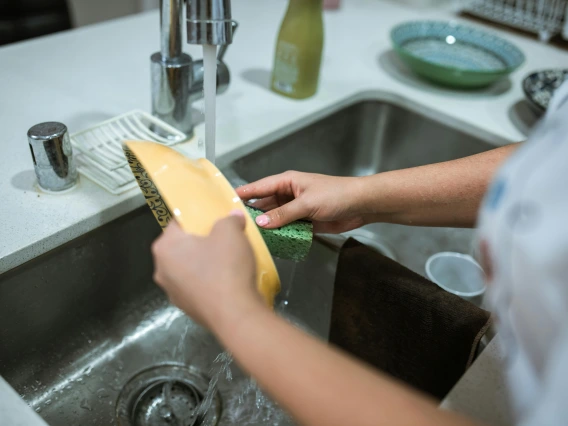There's Only One You
Take good care of yourself with a self-care plan as unique as you are.
Make a Self-Care Menu
Self-care works best when it's part of your routine. When you have options to choose from and know what works for you, it's easier to make it part of your day. Pick and choose from your self-care menu each day to feel your best.
Start with What Matters to You
Start your self-care menu with what matters most to you—what's non-negotiable, helps you feel your best, and brings you purpose.
Set a Goal & Write It Down
Write down your goals to boost their impact. Whether it's drinking more water, walking, or getting enough sleep, keep it simple and place your goal where you can see it. Focus on progress, not perfection, and celebrate your achievements as you go.
Give Yourself Options
Self-care can be both fun and sustaining—whether it's doing something that brings you joy or activities that recharge you and make life easier in the long run, it's all about giving yourself options to choose from.

Fun
Include things you do just for fun, like:
- video games
- audiobooks
- watching a movie
- singing in the car
- podcasts

Sustaining
Include items that help your life go more smoothly and help you in the long run, like:
- doing laundry
- setting boundaries
- screen time limits
- using a planner
- therapy
- going to office hours

Fun + Sustaining
Include things that help you in the long run and are also fun to do, like:
- having a meal with friends
- studying with a group
- going outside
- organizing your work space
Put Self-Care into Action With These Tips
Self-care comes in many forms, and finding what works best for you is key. Here are some common types of self-care, along with practical tips to help you put each one into action.
Explore Your Self-Care Options

Relax Your Body and Mind
Including relaxation in your self-care routine helps you stay balanced, clear, and focused. Taking time to relax before stress hits makes it easier to stay calm and handle challenges more smoothly.
Everyday Strategies for Relaxation
Find small moments each day to do something calming, even when you're not stressed—like enjoying a favorite breakfast, listening to a mood-boosting playlist, reading, laughing with friends, or simply breathing. Practicing relaxation daily builds resilience for tougher times.
Here are a few ways to relax every day:
- Take a few deep breaths
- Go for a short walk outside
- Spend 5 minutes stretching
- Listen to soothing music or nature sounds
- Do a 5-minute guided meditation or breathing exercise
- Read for fun or listen to an audiobook
- Imagine yourself in a peaceful place
- Rest your eyes with screen-free time
Express Yourself Through Writing
Journaling and expressive writing can help you explore your thoughts and discover more about yourself. Including writing in your self-care routine gives you space to process your feelings and gain insights into your values, priorities, and the best path forward.
The Science of Journaling
Give Yourself Quality Me Time
Things to Do During Your Me Time

Explore
Spend time alone discovering new places you enjoy, learning a skill, exploring your interests, and uncovering more about yourself or the world.

Create
Solitary time is perfect for sparking creativity, whether solving an equation, writing a song, or building a computer.

Reflect
Solitary time is great for reflection—grab your journal, put on some music, and think about who you are, what you want, and where you're headed.
Build & Nurture Your Social Support System
Social support helps us feel connected, motivated, and resilient. When you have a social support network and healthy connections, you feel less alone through the ups and downs of life. Keep in mind that social support comes in many forms and in many places. To build and nurture your social support system, focus on the people and communities where you feel most comfortable and understood.
How it works:
Map out your support system:
Build your network:
Practice Talking to People
If you feel uncomfortable or anxious about socializing, you're not alone. Many people struggle with this. Practice talking to people and accept the awkward moments as part of the process.
Here are some skills that can help:
Create Opportunities to Meet People
- Spend time in places people naturally gather
- Say yes to invitations
- Attend social events hosted by your program, job, or club
- Join a club or organization
- Volunteer
- Look for opportunities to strike up a conversation
- Invite someone to do something
Get Closer to the People You Know
Not everyone will be your best friend, but you can still get closer to the people you know. Try these tips:
- Ask questions
- Practice active listening
- Share something about yourself
- Show your authentic self
- Bond over a new experience or shared interest
- Let others know what you appreciate about them
- Show support during good times and bad
Practice Problem-Solving
Problem-solving is incredibly helpful to our wellbeing. Knowing how to identify problems and find workable solutions helps us learn, grow, and feel more capable.
Here's how it works:


